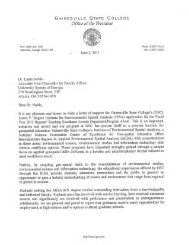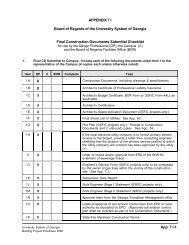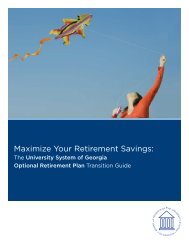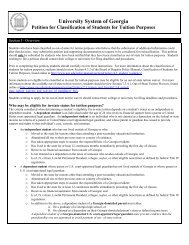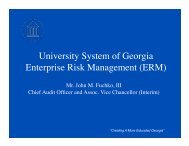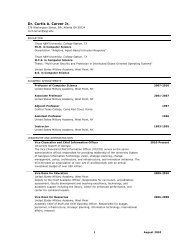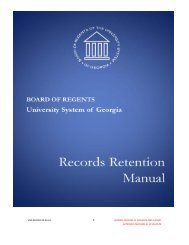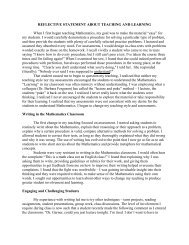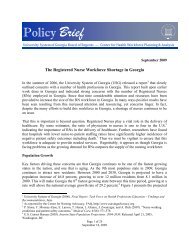WReier-Aviles on DSKGBLS3C1PROD with RULES266874 Federal Register / Vol. 75, No. 209 / Friday, October 29, 2010 / Rules and Regulationsfinancial aid. If it is not, suchcompensation would continue to bepermissible even with the removal <strong>of</strong>the safe harbor from current§ 668.14(b)(22)(ii)(C).Changes: None.Comment: A number <strong>of</strong> commentersvoiced their support for the safe harborfrom current § 668.14(b)(22)(ii)(E),which permits compensation basedupon a student’s successfullycompleting his or her educationalprogram or one academic year <strong>of</strong> his orher educational program, whichever isshorter. Some commenters expressedconcern that removal <strong>of</strong> this safe harborwould eliminate an important safeguardfor students because this safe harborencourages institutions to admit onlyqualified students. Other commentersnoted that to disallow incentivecompensation based on completion <strong>of</strong>an educational program is contrary tothe Administration’s stated goal <strong>of</strong>student retention. Several commenterssuggested that the <strong>Department</strong> shouldmeasure the positive effect thatincentive payments based oncompletion <strong>of</strong> an educational programcan have on students’ educationalexperience. Another commenter askedwhether payments based on a graduatedstudent’s employment in the student’sfield <strong>of</strong> study would be permitted underthe new regulatory framework forincentive compensation.Discussion: The <strong>Department</strong> believesthat an institution’s resolute andongoing goal should be for its studentsto complete their educational programs.Employees should not be rewardedbeyond their standard salary or wagesfor their contributions to thisfundamental duty. The safe harbor incurrent § 668.14(b)(22)(ii)(E) permitscompensation that is ‘‘indirectly’’ basedupon securing enrollments—that is,unless the student enrolls, the studentcannot successfully complete aneducational program. With theproliferation <strong>of</strong> short-term, acceleratedprograms, and the potential for shorterand shorter programs, we have seenincreased efforts by institutions to relyupon this safe harbor to incentivizerecruiters. Accordingly, we believe thatthe retention <strong>of</strong> the current safe harborcan be readily exploited, and that it isnot necessary for institutions toappreciate the value <strong>of</strong> keeping studentsin school. On balance, we believe thatthe proliferation <strong>of</strong> these types <strong>of</strong>programs justify any benefit that thissafe harbor allegedly provided studentsby encouraging institutions to admitonly qualified students.We disagree with the commenter whostated that removal <strong>of</strong> this safe harbor isinconsistent with the Administration’sgoal <strong>of</strong> increasing student retention inpostsecondary education. Institutionsshould not need this safe harborallowing incentive payments torecruiters to demonstrate theircommitment to retaining studentswithin their program <strong>of</strong> instruction.In addition, there is nothing about themaking <strong>of</strong> incentivized payments torecruiters based upon student retentionthat enhances the quality <strong>of</strong> a student’seducational experience. If the program<strong>of</strong> instruction has value and isappropriate for a student’s needs, astudent will likely enjoy a positiveeducational experience regardless <strong>of</strong> themanner in which the student’s recruiteris compensated.Finally, the <strong>Department</strong>’s experiencehas shown that some institutions payincentive compensation to recruitersbased upon claims that the studentswho the recruiter enrolled graduatedand received jobs in their fields <strong>of</strong>study. Yet, included among the abusesthe <strong>Department</strong> has seen, for example, isa circumstance where a student’s field<strong>of</strong> study was culinary arts, and the socalledemployed student was workingan entry-level position in the fast foodindustry. Such a position did notrequire the student to purchase a highereducation ‘‘credential.’’ As a result, webelieve that paying bonuses to recruitersbased upon retention, completion,graduation, or placement remain inviolation <strong>of</strong> the HEA’s prohibition onthe payment <strong>of</strong> incentive compensation.Changes: None.Comment: Many commentersquestioned our rationale for eliminatingthe safe harbor in current§ 668.14(b)(22)(ii)(G), which exemptsmanagerial and supervisory employeeswho do not directly manage orsupervise employees who are directlyinvolved in recruiting or admissionsactivities, or the awarding <strong>of</strong> title IV,HEA program funds from theprohibition on receiving incentivepayments. These commenters arguedthat a bright line designation is neededand that the incentive compensationban should only apply to employeeswho are involved in direct recruitmentor admission <strong>of</strong> students or decisionsinvolving the award <strong>of</strong> title IV, HEA aid.Others recommended that we retain thissafe harbor, and that we clarify that thewords ‘‘indirectly or directly’’ do notapply to the determination <strong>of</strong> whichpersons are covered by the prohibition.Several commenters expressed theirconcerns about having the regulationsprohibit compensation practices at anylevel <strong>of</strong> an organization, no matter howfar removed from actual recruitment,admissions, or financial aid activity.These commenters argued that such anVerDate Mar2010 14:10 Oct 28, 2010 Jkt 223001 PO 00000 Frm 00044 Fmt 4701 Sfmt 4700 E:\FR\FM\29OCR2.SGM 29OCR2approach would prevent institutionsfrom evaluating top management withrespect to student population metrics orany other business or organizationalmetric that is a function <strong>of</strong> studentenrollment.A few commenters raised morespecific concerns about thecompensation <strong>of</strong> top college <strong>of</strong>ficials insituations where the president attendsan open house or speaks with potentialstudents who the institution isrecruiting, either in a group orindividually. Some commenters alsoasked whether the proposed regulationswould permit a president to receive abonus or other payment if one factor inattaining the bonus or other paymentwas meeting an institutionalmanagement plan or goal that includedincreasing minority enrollment by acertain percentage.Finally, a few commenters askedwhether institutions can still rewardathletic coaches whose student athletesstay in school and graduate.Discussion: We intend the incentivecompensation ban in § 668.14(b)(22)(i)to apply to all employees at aninstitution who are engaged in anystudent recruitment or admissionactivity or in making decisionsregarding the award <strong>of</strong> title IV, HEAprogram funds. We interpret theseemployees to include any higher levelemployee with responsibility forrecruitment or admission <strong>of</strong> students, ormaking decisions about awarding titleIV, HEA program funds. To make thisclearer, we are revising§ 668.14(b)(22)(iii) to add a definitionfor the term entity or person engaged inany student recruitment or admissionactivity or in making decisions aboutthe award <strong>of</strong> financial aid. This newdefinition expressly includes anyemployee who undertakes recruiting oradmitting <strong>of</strong> students or who makesdecisions about and awards title IV,HEA program funds, as well as higherlevel employees as specified.Therefore, the actions <strong>of</strong> a collegepresident could potentially come withinthe HEA’s prohibition on the payment<strong>of</strong> incentive compensation. However,the <strong>Department</strong> does not see how mereattendance at an open house or speakingwith prospective students about thevalue <strong>of</strong> a college education or thevirtues <strong>of</strong> attending a particularinstitution would violate the incentivecompensation plan. Other activitiesshould be evaluated within the context<strong>of</strong> the <strong>Department</strong>’s previouslydiscussed two-part test to receiveassistance as to whether a particularactivity is permissible.Finally, recruitment <strong>of</strong> studentathletes is not different from
Federal Register / Vol. 75, No. 209 / Friday, October 29, 2010 / Rules and Regulations66875WReier-Aviles on DSKGBLS3C1PROD with RULES2recruitment <strong>of</strong> other students. Incentivecompensation payments to athleticdepartment staff are governed by therestrictions included in § 668.14(b)(22).If the payments are made based onsuccess in securing enrollments or theaward <strong>of</strong> financial aid, the payments areprohibited; however, the <strong>Department</strong>does not consider ‘‘bonus’’ paymentsmade to coaching staff or other athleticdepartment personnel to be prohibited ifthey are rewarding performance otherthan securing enrollment or awardingfinancial aid, such as a successfulathletic season, team academicperformance, or other measures <strong>of</strong> asuccessful team.Changes: We have added a definition<strong>of</strong> the term entity or person engaged inany student recruitment or admissionactivity or in making decisions aboutthe award <strong>of</strong> financial aid to§ 668.14(b)(22)(iii). New paragraph(b)(22)(iii)(C) <strong>of</strong> this section providesthat the term means—(1) With respect to an entity, anyinstitution or organization thatundertakes the recruiting or theadmitting <strong>of</strong> students or that makesdecisions about and awards title IV,HEA program funds; and(2) With respect to a person, anyemployee who undertakes recruiting oradmitting <strong>of</strong> students or who makesdecisions about and awards title IV,HEA program funds, and any higherlevel employee with responsibility forrecruitment or admission <strong>of</strong> students, ormaking decisions about awarding titleIV, HEA program funds.Comment: One commenter asked howthe removal <strong>of</strong> the safe harbor fromcurrent § 668.14(b)(22)(ii)(H), whichpermits an institution to provide a tokengift not to exceed $100 to an alumnusor student provided that the gift is notin the form <strong>of</strong> money and no more thanone gift is provided annually to anindividual, will affect institutionscompensating students for referrals. Thecommenter asked whether an individualwho is referred can be given ascholarship for friends or family <strong>of</strong> theindividual who is referring or a tuitionwaiver.Discussion: Section 668.14(b)(22)does not prohibit institutions fromproviding any commission, bonus, orincentive payment to students who arereferrals. Therefore, an individual whois referred to an institution should beable to receive whatever scholarshipmoney or tuition assistance that he orshe may otherwise be eligible to receivewithout violating the HEA.Changes: None.Comment: Several commenters askedfor clarification regarding the safeharbor in current § 668.14(b)(22)(ii)(J)permitting an institution to awardcompensation for Internet-basedrecruitment and admission activitiesthat provide information about theinstitution to prospective students, referprospective students to the institution,or permit prospective students to applyfor admission online. Specifically, thecommenters asked us to clarify thatinstitutions can make payments to thirdparties that provide Internet-basedrecruitment and admission services aslong as they do not otherwise violate thestatutory prohibition. Other commentersasked for confirmation that clickthroughpayments are permitted if thethird party is paid based on those whoclick, not those who enroll. Othercommenters requested examples <strong>of</strong>permitted relationships.Discussion: The HEA does notprohibit advertising and marketingactivities by a third party, as long aspayment to the third party is based onthose who ‘‘click’’ and is not based inany part, directly or indirectly, on thenumber <strong>of</strong> individuals who enroll or areawarded financial aid; therefore, theregulatory language would not prohibitsuch click-through payments. Further,institutions may make payments to thirdparties and entities with formal thirdpartyarrangements as long as the partiesare not compensated in any part,directly or indirectly, based on successin securing enrollments or the award <strong>of</strong>financial aid.Changes: None.Comment: Many commenters <strong>of</strong>feredsuggestions regarding the safe harborsreflected in current § 668.14(b)(22)(ii)(K)and (b)(22)(ii)(L), which both involvepayments to third parties for sharedservices. A number <strong>of</strong> commentersrepresenting organizations that providea variety <strong>of</strong> services to institutions askedfor clarification about their continuedability to assist institutions in this way,as long as the compensationarrangements are not prohibited by theHEA. Many commenters asked whethertuition-sharing arrangements with thirdpartiesto secure servicers that includerecruitment would be permitted. Theyquestioned whether these arrangementsshould be treated the same asarrangements involving volume-drivenpayments. Several commentersexpressed concern about the affect theseregulations will have on third partieswho provide services to assist studentswho study abroad.One commenter suggested thatentities that provide enrollment servicesbe able to elect to be treated as ‘‘thirdpartyservicers,’’ with all <strong>of</strong> therestrictions, obligations, liabilities,reporting requirements, and oversightthat accompany that status.VerDate Mar2010 14:10 Oct 28, 2010 Jkt 223001 PO 00000 Frm 00045 Fmt 4701 Sfmt 4700 E:\FR\FM\29OCR2.SGM 29OCR2Other commenters asked whetherinstitutions would be held accountablefor the actions <strong>of</strong> third-party servicers.A few commenters also requested the<strong>Department</strong> to provide examples <strong>of</strong>arrangements with third parties thatwould be permitted under the newregulatory framework (i.e., with theremoval <strong>of</strong> the safe harbors from current§ 668.14(b)(22)(ii)(K) and (b)(22)(ii)(L)).Discussion: The <strong>Department</strong>understands the value <strong>of</strong> partnershipsbetween institutions and entities thatprovide various support andadministrative services to theseinstitutions. Such arrangements arepermitted under these regulations aslong as no entity or person engaged inany student recruitment or admissionactivity or in making decisions aboutthe award <strong>of</strong> financial aid (as defined in§ 668.14(b)(22)(iii)(C)) is compensatedin any part, directly or indirectly, basedupon success in securing enrollments orthe award <strong>of</strong> financial aid.In addition, as the <strong>Department</strong> statedin the NPRM, arrangements underwhich an institution is billed based onthe number <strong>of</strong> student files that areprocessed (e.g., a volume-drivenarrangement) are not automaticallyprecluded, provided that payment is notbased in any part, directly or indirectly,on success in securing studentenrollments or the award <strong>of</strong> financialaid.Further, it is longstanding <strong>Department</strong>policy that an institution is responsiblefor the actions <strong>of</strong> any entity thatperforms functions and tasks on theinstitution’s behalf. The definition <strong>of</strong> athird-party servicer is established in§ 668.2; the responsibilities <strong>of</strong> a thirdpartyservicer are described in § 668.25.No additional language is needed.Changes: None.Permissible Compensation ActivitiesComment: Many commentersrequested clarification on the types <strong>of</strong>compensation that would be permittedunder proposed § 668.14(b)(22) andsection 487(a)(20) <strong>of</strong> the HEA. A fewcommenters who supported theproposed changes to § 668.14(b)(22)suggested additional alterations tostrengthen the language—such asmoving language we had included inthe NPRM preamble to the regulatorytext—to ensure that incentive paymentsare not based ‘‘in any part’’ on successin securing enrollments or financial aid.In addition, several commenterssuggested that more than two changes inpay in a calendar year should beconsidered evidence that the paymentsare incentive compensation.These commenters also requestedguidance about allowable salary
- Page 1 and 2: Friday,October 29, 2010Part IIDepar
- Page 3 and 4: Federal Register / Vol. 75, No. 209
- Page 6 and 7: 66836 Federal Register / Vol. 75, N
- Page 8 and 9: 66838 Federal Register / Vol. 75, N
- Page 10 and 11: WReier-Aviles on DSKGBLS3C1PROD wit
- Page 12 and 13: 66842 Federal Register / Vol. 75, N
- Page 14 and 15: 66844 Federal Register / Vol. 75, N
- Page 16 and 17: WReier-Aviles on DSKGBLS3C1PROD wit
- Page 18 and 19: 66848 Federal Register / Vol. 75, N
- Page 20 and 21: 66850 Federal Register / Vol. 75, N
- Page 22 and 23: WReier-Aviles on DSKGBLS3C1PROD wit
- Page 24 and 25: 66854 Federal Register / Vol. 75, N
- Page 26 and 27: WReier-Aviles on DSKGBLS3C1PROD wit
- Page 28 and 29: 66858 Federal Register / Vol. 75, N
- Page 30 and 31: 66860 Federal Register / Vol. 75, N
- Page 32 and 33: 66862 Federal Register / Vol. 75, N
- Page 34 and 35: 66864 Federal Register / Vol. 75, N
- Page 36 and 37: 66866 Federal Register / Vol. 75, N
- Page 38 and 39: WReier-Aviles on DSKGBLS3C1PROD wit
- Page 40 and 41: WReier-Aviles on DSKGBLS3C1PROD wit
- Page 42 and 43: 66872 Federal Register / Vol. 75, N
- Page 46 and 47: WReier-Aviles on DSKGBLS3C1PROD wit
- Page 48 and 49: WReier-Aviles on DSKGBLS3C1PROD wit
- Page 50 and 51: 66880 Federal Register / Vol. 75, N
- Page 52 and 53: WReier-Aviles on DSKGBLS3C1PROD wit
- Page 54 and 55: 66884 Federal Register / Vol. 75, N
- Page 56 and 57: 66886 Federal Register / Vol. 75, N
- Page 58 and 59: WReier-Aviles on DSKGBLS3C1PROD wit
- Page 60 and 61: WReier-Aviles on DSKGBLS3C1PROD wit
- Page 62 and 63: WReier-Aviles on DSKGBLS3C1PROD wit
- Page 64 and 65: WReier-Aviles on DSKGBLS3C1PROD wit
- Page 66 and 67: WReier-Aviles on DSKGBLS3C1PROD wit
- Page 68 and 69: WReier-Aviles on DSKGBLS3C1PROD wit
- Page 70 and 71: WReier-Aviles on DSKGBLS3C1PROD wit
- Page 72 and 73: 66902 Federal Register / Vol. 75, N
- Page 74 and 75: WReier-Aviles on DSKGBLS3C1PROD wit
- Page 76 and 77: WReier-Aviles on DSKGBLS3C1PROD wit
- Page 78 and 79: 66908 Federal Register / Vol. 75, N
- Page 80 and 81: WReier-Aviles on DSKGBLS3C1PROD wit
- Page 82 and 83: 66912 Federal Register / Vol. 75, N
- Page 84 and 85: WReier-Aviles on DSKGBLS3C1PROD wit
- Page 86 and 87: 66916 Federal Register / Vol. 75, N
- Page 88 and 89: WReier-Aviles on DSKGBLS3C1PROD wit
- Page 90 and 91: WReier-Aviles on DSKGBLS3C1PROD wit
- Page 92 and 93: WReier-Aviles on DSKGBLS3C1PROD wit
- Page 94 and 95:
66924 Federal Register / Vol. 75, N
- Page 96 and 97:
WReier-Aviles on DSKGBLS3C1PROD wit
- Page 98 and 99:
66928 Federal Register / Vol. 75, N
- Page 100 and 101:
WReier-Aviles on DSKGBLS3C1PROD wit
- Page 102 and 103:
66932 Federal Register / Vol. 75, N
- Page 104 and 105:
WReier-Aviles on DSKGBLS3C1PROD wit
- Page 106 and 107:
66936 Federal Register / Vol. 75, N
- Page 108 and 109:
66938 Federal Register / Vol. 75, N
- Page 110 and 111:
66940 Federal Register / Vol. 75, N
- Page 112 and 113:
66942 Federal Register / Vol. 75, N
- Page 114 and 115:
66944 Federal Register / Vol. 75, N
- Page 116 and 117:
66946 Federal Register / Vol. 75, N
- Page 118 and 119:
WReier-Aviles on DSKGBLS3C1PROD wit
- Page 120 and 121:
WReier-Aviles on DSKGBLS3C1PROD wit
- Page 122 and 123:
WReier-Aviles on DSKGBLS3C1PROD wit
- Page 124 and 125:
66954 Federal Register / Vol. 75, N
- Page 126 and 127:
WReier-Aviles on DSKGBLS3C1PROD wit
- Page 128 and 129:
66958 Federal Register / Vol. 75, N
- Page 130 and 131:
66960 Federal Register / Vol. 75, N
- Page 132 and 133:
WReier-Aviles on DSKGBLS3C1PROD wit
- Page 134 and 135:
WReier-Aviles on DSKGBLS3C1PROD wit
- Page 136 and 137:
WReier-Aviles on DSKGBLS3C1PROD wit
- Page 138 and 139:
66968 Federal Register / Vol. 75, N
- Page 140 and 141:
66970 Federal Register / Vol. 75, N
- Page 142 and 143:
66972 Federal Register / Vol. 75, N
- Page 144 and 145:
66974 Federal Register / Vol. 75, N



